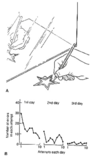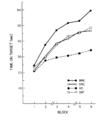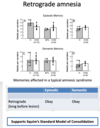Neuropsychology of Memory Flashcards
(31 cards)
What Amnesia is
- Intelligence is …
- Attentional span is …
- Personality is …
- Ability to take in new information is … and usually … …
- Intelligence is intact
- Attentional span is intact
- Personality is unaffected
- Ability to take in new information is severely and usually permanently affected
What Amnesia is
- Intelligence is intact
- Attentional span is intact
- p… is unaffected
- Ability to take in … … is severely and usually … affected
- Intelligence is intact
- Attentional span is intact
- Personality is unaffected
- Ability to take in new information is severely and usually permanently affected
What Amnesia is
- … is intact
- … span is intact
- Personality is unaffected
- Ability to take in new information is … and usually … affected
- Intelligence is intact
- Attentional span is intact
- Personality is unaffected
- Ability to take in new information is severely and usually permanently affected
Amnesia - Continued
- Verbal and visual short-term memory is …
- Phonological store and visuospatial sketchpad …
- Double dissociation with patients and … Short Term Memory
- Digit span
- Repeat the numbers “2…7…4…9…2…8”
- Spatial span
- Tap the same blocks as me, in the same order
- HM’s surgery involved bilateral removal of his… … lobes
- Included the “…”
- Amnesia is usually caused by damage to the … … lobe or anatomically connected regions
- Can occur in head injuries, Alzheimer’s, epilepsy, stroke
- Verbal and visual short-term memory is intact
- Phonological store and visuospatial sketchpad unaffected
- Double dissociation with patients and impaired Short Term Memory
- Digit span
- Repeat the numbers “2…7…4…9…2…8”
- Spatial span
- Tap the same blocks as me, in the same order
- HM’s surgery involved bilateral removal of his medial temporal lobes
- Included the “hippocampus”
- Amnesia is usually caused by damage to the medial temporal lobe or anatomically connected regions
- Can occur in head injuries, Alzheimer’s, epilepsy, stroke

- Amnesia is usually caused by damage to the … … lobe or anatomically connected regions
- Can occur in head …, Alzheimer’s, e…, s…
- Amnesia is usually caused by damage to the medial temporal lobe or anatomically connected regions
- Can occur in head injuries, Alzheimer’s, epilepsy, stroke

Anterograde Amnesia
- Anterograde means after … …
- Anterograde … memories are severely affected
- HM was severely impaired no matter what kind of memory test was given (Corkin, 2002)
- Words, faces, tones, public events, etc
- Regardless of the sensory modality through which info was presented
- Regardless of text format (free recall, cued recall, recognition)
- HM was severely impaired no matter what kind of memory test was given (Corkin, 2002)
- Anterograde means after brain injury
- Anterograde episodic memories are severely affected
- HM was severely impaired no matter what kind of memory test was given (Corkin, 2002)
- Words, faces, tones, public events, etc
- Regardless of the sensory modality through which info was presented
- Regardless of text format (free recall, cued recall, recognition)
- HM was severely impaired no matter what kind of memory test was given (Corkin, 2002)

Anterograde Amnesia
- Anterograde means after brain injury
- Anterograde episodic memories are severely affected
- HM was … impaired no matter what kind of memory test was given (Corkin, 2002)
- Words, faces, tones, public events, etc
- Regardless of the sensory modality through which info was …
- Regardless of … format (free recall, cued recall, recognition)
- HM was … impaired no matter what kind of memory test was given (Corkin, 2002)
- Anterograde means after brain injury
-
Anterograde episodic memories are severely affected
-
HM was severely impaired no matter what kind of memory test was given (Corkin, 2002)
- Words, faces, tones, public events, etc
- Regardless of the sensory modality through which info was presented
- Regardless of text format (free recall, cued recall, recognition)
-
HM was severely impaired no matter what kind of memory test was given (Corkin, 2002)

Procedural memory
- Procedural memory
- Can Amnesics learn new skills?
- Mirror tracing (Corkin, 1968)
- Mirror reading (Cohen & Squire, 1980)
- Procedural memory
- Amnesics can learn new skills
- Mirror tracing (Corkin, 1968)
- Mirror reading (Cohen & Squire, 1980)
- By day 3 - Almost flawless drawing by HM

Procedural memory - Butters et al., (1990)
- Task was a pursuit-rotor task
- Healthy controls and patients with Alzheimer’s disease (DAT) showed … learning (… memory)
- Patients with Huntingdon’s disease (HD) were …
- Evidence for … procedural memory system
- Task was a pursuit-rotor task
- Healthy controls and patients with Alzheimer’s disease (DAT) showed normal learning (implicit memory)
- Patients with Huntingdon’s disease (HD) were impaired
- Evidence for independent procedural memory system

Procedural memory (non-conscious, implicit memory)
- Learning of motor skills (e.g. riding a bike) is distinct from explicit long-term memory
- Dedicated brain systems for procedural memory
- … ganglia
- Impaired in … disease
- When a skill becomes automatic, it can operate in the absence of …
- Learning of motor skills (e.g. riding a bike) is distinct from explicit long-term memory
- Dedicated brain systems for procedural memory
-
Basal ganglia
- Impaired in Huntingdon’s disease
-
Basal ganglia
- When a skill becomes automatic, it can operate in the absence of awareness
Priming (Non conscious, implicit memory)
- Degraded picture identification - task - see one of these pictures with fragmented info until they are more apparent - if you repeat, people need less of info to identify image
- 5 … patients - showed very clear learning effect - long-term … of the ability to identify these pictures even though they have no … that they have done this before
- (Warrington & Weiskrantz, 1970)
- Degraded picture identification - task - see one of these pictures with fragmented info until they are more apparent - if you repeat, people need less of info to identify image
- 5 amnesic patients - showed very clear learning effect - long-term retention of the ability to identify these pictures even though they have no recollection that they have done this before
- (Warrington & Weiskrantz, 1970)

Anterograde amnesia - Declarative memory processes
- Tulving, 1971
- … memory:
- Memory for events and occurrences that are specific in time and place
- “what” “where” “when”
- … memory:
- Knowledge of facts, concepts, word meanings, etc.
- Can be retrieved without knowledge about where and when the information was acquired
- Tulving, 1971
-
Episodic memory:
- Memory for events and occurrences that are specific in time and place
- “what” “where” “when”
-
Semantic memory:
- Knowledge of facts, concepts, word meanings, etc.
- Can be retrieved without knowledge about where and when the information was acquired
Anterograde amnesia - Declarative memory processes
- Tulving, 1971
- Episodic memory:
- Memory for events and occurrences that are specific in … and …
- “w..” “w..” “w..”
- Semantic memory:
- Knowledge of facts, concepts, word meanings, etc.
- Can be … without knowledge about … and … the information was acquired
- Tulving, 1971
-
Episodic memory:
- Memory for events and occurrences that are specific in time and place
- “what” “where” “when”
-
Semantic memory:
- Knowledge of facts, concepts, word meanings, etc.
- Can be retrieved without knowledge about where and when the information was acquired
Anterograde amnesia - Declarative memory
- All declarative memories (episodic and semantic) depend on … … lobes for their acquisition and short-term retention
- Declarative memory theory
- All declarative memories (episodic and semantic) depend on medial temporal lobes for their acquisition and short-term retention
- Declarative memory theory
Anterograde amnesia - Memories affected in a typical amnesic syndrome
- What about semantic?

- So semantic also poor - Supports Squire’s Declarative Memory Theory

Against the Declarative memory theory
- States - Can new semantic memories be formed in amnesia? NO
- BUT
- Beth, Jon and Kate are typical amnesics (Vargha-Khadem et al., 1997)
- They sustained damage to the hippocampus just after birth
- Have grossly impaired … memory
- BUT, they completed normal schooling, have good vocabularies and knowledge about the world
- Don’t require to have a functioning … … lobe system to acquire good semantic knowledge
- BUT could criticise study because it’s maybe representing special case - early life damage - adapt to memory problems
- States - Can new semantic memories be formed in amnesia? NO
- BUT
- Beth, Jon and Kate are typical amnesics (Vargha-Khadem et al., 1997)
- They sustained damage to the hippocampus just after birth
- Have grossly impaired episodic memory
- BUT, they completed normal schooling, have good vocabularies and knowledge about the world
- Don’t require to have a functioning medial temporal lobe system to acquire good semantic knowledge
- BUT could criticise study because it’s maybe representing special case - early life damage - adapt to memory problems

Retrograde Amnesia
- Retrograde means … … …
- Some degree of retrograde amnesia is almost … present
- The extent of retrograde amnesia for episodic memories is highly contested
- Retrograde means before brain injury
- Some degree of retrograde amnesia is almost always present
- The extent of retrograde amnesia for episodic memories is highly contested

Retrograde Amnesia
- All declarative memories (episodic and semantic) depend on … … lobes for their acquisition and short-term retention
- … memory theory
- Over time, declarative memories become … to other brain regions
- Standard Model of …
- All declarative memories (episodic and semantic) depend on medial temporal lobes for their acquisition and short-term retention
- Declarative memory theory
- Over time, declarative memories become consolidated to other brain regions
- Standard Model of Consolidation
Standard model of consolidation

Retrograde amnesia - Memories affected in a typical amnesic syndrome
- Supports Squire’s Standard Model of Consolidation

Retrograde amnesia
- Semantic knowledge learnt long ago is intact
- Evidence for preserved remote episodic memory is mixed
- Some patients seemingly show very good …
- But are these memories highly … and recalled “by rote”?
- Possible differences between patients in … location, etc.
- Semantic knowledge learnt long ago is intact
-
Evidence for preserved remote episodic memory is mixed
- Some patients seemingly show very good recall
- But are these memories highly practiced and recalled “by rote”?
- Possible differences between patients in lesion location, etc.
Other types of memory impairment
- … dementia
- C…
- Semantic dementia
- Confabulation
Impairment of semantic memory
- Semantic dementia
- Poor knowledge of meaning of … or …
- … difficulties
- Including semantically related errors (e.g. “dog” for rabbit).
- Not confined to one m…
- Deficits may include a difficulty in recognizing …
- Semantic dementia
- Poor knowledge of meaning of words or concepts
-
Naming difficulties
- Including semantically related errors (e.g. “dog” for rabbit).
-
Not confined to one modality
- Deficits may include a difficulty in recognizing sounds (e.g. doorbell or telephone)

Typical scan of an individual with semantic dementia:
- Semantic knowledge associated with lateral … cortex (on the left side of the brain)
- Typical scan of an individual with semantic dementia
- Semantic knowledge associated with lateral temporal cortex (on the left side of the brain)




